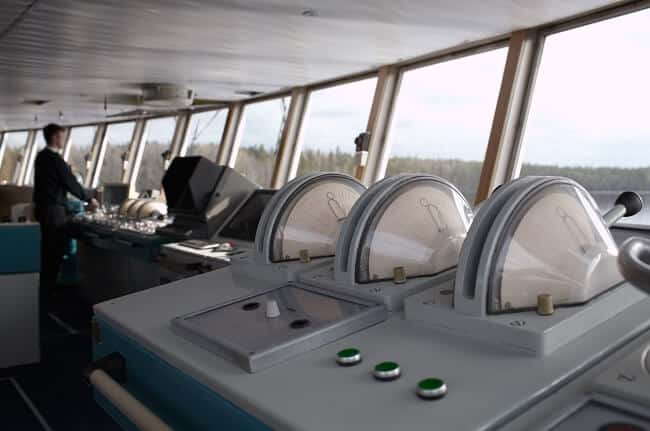The contemporary state of affairs with respect to employment in the shipping industry is a bit dodgy. Many reasons are currently responsible for lack of jobs among young deck cadets and marine engineers.
There are new vessels being built, new shipping companies cropping up, maritime officers are still in demand, but then there are barely any openings for fresh graduates in the maritime sector.
So where does all this leave current college students and recent graduates of the maritime academies?
Whether in their first year or final year, deck cadets and junior marine engineers will continuously be bothered by job placement woes. Worrisome discussions among seniors and peers don’t help the unemployment situation either.
The harsh reality is that the abundance of entry level jobs in shipping has significantly diminished and the number of companies visit the academy campuses have drastically reduced. So naturally, for a young maritime professional looking out to board his first vessel, things begin to seem a bit gloomy.
Nevertheless, it is quite obvious that there still are quite a good number of maritime jobs up for grabs and with the huge number of deck cadets and junior marine engineers scouring for them, the availability becomes subject to an extremely high level of competition.
So how should an individual go about tackling this deficit in jobs, the competition that comes with it, and avoid mistake while searching for jobs?
1. Embrace Positivity
Our surrounding environment is filled with information about the devastating consequences that the unemployment in the shipping industry is having on deck cadets and junior engineers. Unfortunately as a result, the motivation and desire to go forth with a career in shipping dies a forced death as a result of unemployment.
It is extremely important for an individual to realize that employment in this sector has not vaporized overnight. Times like these can be disorienting, resulting in an overall dent in the confidence of one’s abilities and becoming evident in the job interviews.
It’s therefore necessary at such times to take a step back and stop worrying about things beyond one’s own control and start evaluating the things that are. Having the right attitude is of great importance. What a young maritime professional should worry about is his employment, the massively important need to do some networking, and basically treating the search for a job as a full time job itself!
2. Honing your skills
With the huge number of backlogs and fresh deck cadets and junior engineers flooding the market, what is it that will set a certain maritime professional apart? When it comes to the aspect of ’employability’, shipping companies aren’t just looking for high GPA (Grade Point Average).
The need for an individual that can set himself apart from the rest is the trick of the trade nowadays. Adding that extra pump to your CV by getting involved in constructive and productive activities across a wide spectrum can be the deciding factor for an employer for choosing between you and another candidate when it’s down to the last decision.
Think of it from the point of view that you’re the employer- Now who would be your choice for a job, a deck cadet that has just been doing the rounds of various companies regularly hoping to get selected or someone who’s done some voluntary work/paid internship in his free time since graduation?
The idea is to sell yourself as a commodity to the employer and cater to the requirement of a well rounded individual who’s willing to fulfill the criterion of employment. So, the weight of the CV and the way of presenting oneself becomes a deciding factor in who gets a job. Talking to seniors, working officers working on board and knowing the nature of work, level of discipline and the knowledge necessary to supplement all the practical work is the way to go. Taking up online maritime courses can also help in a great way to tackle unemployment.
3. Continue to learn
The end of college shouldn’t be a prerogative to let those maritime books get covered in dust! Interviews with shipping companies involve a lot of technical questions being asked and therefore, it’s very important to keep the all the important things taught over time intact. For example, going through the ROR book once in a while is a good idea. And by this it is not implied to do rigorous study, but just brush through important topics now and then.
It’s also advisable to finish all the courses required for a deck cadet or junior engineer before sailing. It’s better not to leave any stone unturned for the employer to point out, at least as far as its possible. Such involvement from a prospective worker is a sign of a positive attitude for the employer and evidence that the young maritime professional is ready with all the requirements to start sailing at the earliest.
4. Focus on your goals
It is very important to set ones goals- be it short term or long term, especially while job hunting. Some individuals prefer to quit sailing after working for a few years on ships. Plan that out roughly by figuring out what is to be done to have a well paying job ashore. Some fresh maritime professionals want to go for further education. For e.g. if you want to do an MBA in shipping, find out how to one so.
Postgraduate study is a tedious affair and requires a lot of research and effort. Choosing the right University, finishing statements of purpose etc should be planned out well in advance to procure admission to a purposeful course of study in a renowned institution. Scholarships can help in a big way and it is tough to get one, so an individual looking for a scholarship has to prove he’s worthy and therefore work really hard towards getting it.
For the majority of deck cadet and junior engineers for whom the Merchant Navy is the focus, following the points mentioned above could aid in achieving the motive of having a glossy career in the Merchant Navy.
5. Networking
This is probably the most important aspect of getting a job today in any kind of field. Professional networking can get you in touch with the right people who can get you the right job. Despite the fact that online maritime jobs portals have had a huge boom in the past few years, conventional person to person connections have a far stronger impact on employment.
Locating contacts of people through social networking portals such as Linkedin, Facebook etc. or other platforms, which are somehow connected or have affiliations with shipping companies, is the way to go.
Reaching out to those contacts through a phone call, or an email or any other manner can help immensely in getting the foot in the door. Of course, when in the course of personal interaction it is better to forget the result oriented approach and just converse, drop the right questions at the right time.
Taking the business card or any other form of contact and following up on it is of extreme importance since the candidate requires the job more than the employer needs to give it. One ought to remember that it is important to keep selling and keep putting out the image of an employable, worthy and deserving candidate. Networking is a form of displaying people skills, which is of extreme importance in the shipping industry and a great way to fight frustrations because of joblessness. Another way would be to be around the hubs of shipping offices and introduce oneself to the right people around.
It is very important for a prospective deck cadet or junior engineer to realize that aptitude and attitude are both key aspects in getting a job. Young maritime professionals are still being hired and jobs are still available, the only difference is that it has become a bit tougher than it used to be. In the free time available after graduation, it is very important to build and evaluate the right CV and get in touch with as many shipping companies as possible. Send that email to as many companies as possible, but make sure there’s a worthy CV backing it up.
Is there any other important tip you would like to give it to the fresh deck cadets and junior engineers?









